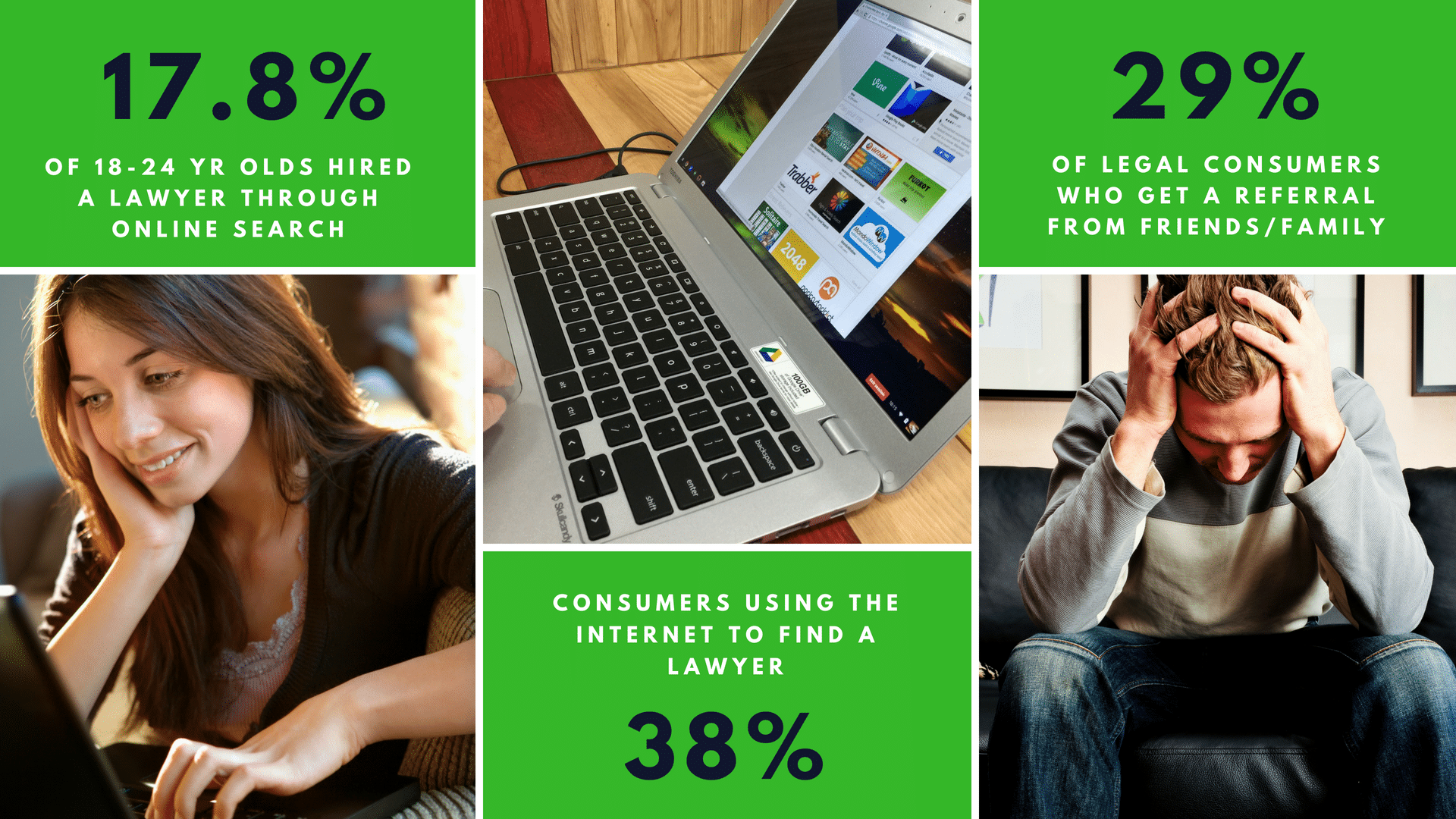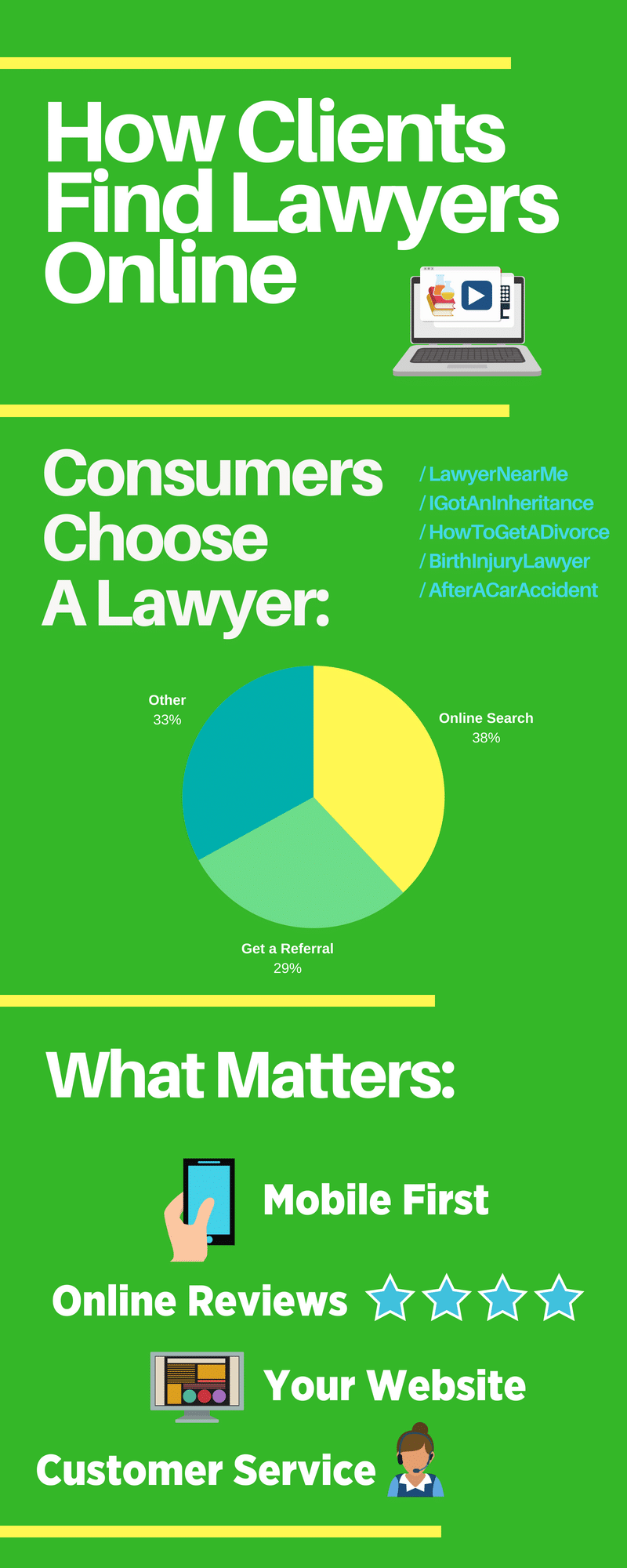
Even today, there are a few lawyers out there who don’t believe the internet will help them get clients. Luckily, the majority of lawyers do believe it, and it’s a good thing they do because that is where clients are looking.
Referral first, search second
According to the ABA Journal, 38% of consumers are turning to the internet for their lawyer search as a first step, compared to 29% asking family and friends for a referral or recommendation first. For the younger legal clients out there, the numbers are even closer with 17.8% of 18-24 year olds searching only online, whereas 12.1% hired a lawyer based on a recommendation from a friend. While these numbers seem reasonable, I would also like to know if the survey takers looked for information about the lawyer online after getting the referral. Personally, when I get a referral from someone the first thing I do is look that company or person up online to verify that the internet agrees with the referral.

How Will They Look Online?
Mobile First, Desktop Second
Mobile search has now surpassed desktop for online searches, especially for initial searches. Think about how many times this has happened in your life; you’re with friends and get a recommendation for XYZ, so you look it up on your phone right away. Then when you get home, you hop on the computer to finalize a purchase or see it on a larger screen.
Now add in the layer of law and imagine you are having a legal issue. You go into work, sit at your desk and go to Google search… wait, you don’t want work to know you are thinking of filing a workers comp claim– you pull out your smart phone and search there. So does everyone else.
This is why it is vital to have a responsive design website and ensure a seamless user experience for your website. A separate mobile site, non-responsive, or static website design are things of the past. Consumers will visit your website and either get frustrated or think your firm is outdated. Neither option is a great first impression to make, no matter how highly recommended you are to that potential client.
Online Reviews
When searching directly by name, the first few search results will generally be your website and online review sites, like Yelp, and your Google My Business profile (which you should set up immediately, if you haven’t already). If a new or potential client sees an average of three out of five stars on your profile, they are more likely to distrust or be skeptical of your firm. If they haven’t yet contacted you are were in the search stage, you name may just end up at the bottom of their list because of negative reviews.
Reviews can come from social media sites as well. Facebook allows reviews on business pages, but Twitter and Instagram could have mentions associated with your name that you aren’t aware of. Make sure to periodically check for hashtags related to your name and your firm’s name, in case you are missing what consumers are saying about you on those sites.
Directories are still important to search and Avvo is a very reliable resource in a legal consumer’s mind. With their proprietary rating system, lawyers may be frustrated with they are scored, but if you can get a few happy clients to balance out their analysis of you, it would be worth it to invest that extra effort.
When it comes to negative reviews, what matters more than the reviews themselves is how you respond. We recommend that our clients follow one of two procedures for negative reviews: 1. Respond directly to the review stating that you apologize for their experience and would like them to contact you to discuss the situation. 2. If you know who the reviewer is, reach out directly to let them know you saw the review and wanted to apologize and see if you could resolve their frustration.
You never, ever want to engage in a back and forth publicly with an angry consumer. If the reviewer responds in anger, leave it be. Potential clients will see that you tried and that the former client is unwilling to engage. I know a lot of lawyers are worried about responding to these reviews but I have seen my recommendations work in a majority of cases.
On Your Website
Your website is likely the first place potential clients will be judging you. Look at your bio page. Does it scream ‘stereotypical lawyer’ or does it show you as the unique human being that you are? While your experience related to a potential clients legal issue is highly important, their ability to connect with your firm and yourself is more important. There is an attorney I’ve seen who had been a pro wrestler and is now practices personal injury. His page highlights that previous experience and allows potential clients to know a side of him outside of the law degree.
Apart from your personal experience, make sure to include robust and helpful content on your site related to your practice area. Create fun or interactive content, like quizzes, or a chatbot to interact with website visitors. This will keep people on the site longer, which Google likes, and provide resources for potential clients to view your site as a tool for their legal assistance.
Testimonials are widely used in the legal field, especially is personal injury-related practice areas. If your clients aren’t comfortable going on camera or using their likeness, you can repurpose online reviews with just a first name or allow clients to use a pseudonym and mark it as such for legal ethics purposes.
Online To The Real World
What matters most to potential clients isn’t your biography or years of experience. It is a fast response to their inquiry, whether it’s through Facebook message, phone call, email, or GMB Q & A. However they contact you, they want to know you are ready to help. If you don’t have an answering service set up, I highly recommend connecting with one of the many options available. (Two options: Ruby Receptionist, AnswerOne). Consider adding a new contact option of texting. As you gain younger clients, they may be more comfortable making text contact to start, rather than a phone call. You can start this with a dedicated Google phone number or try Apex chat, which offers both chatbot and texting services.
Most Importantly, Be There
What matters most online is simply that you and your law firm exist there with a website, a Google My Business account, other websites linking to your site, and mentions of you or your firm around the web. The effort you choose to put where is up to you.
What matters most to potential clients, regardless of how they found you? That you respond quickly, provide excellent customer service, and value their business.

Relevant Information for me that I was actually looking for.